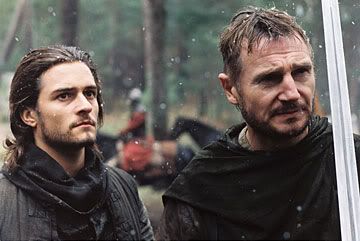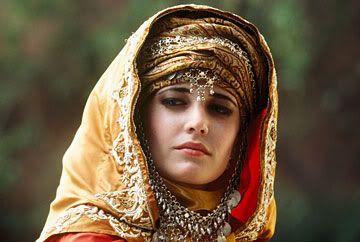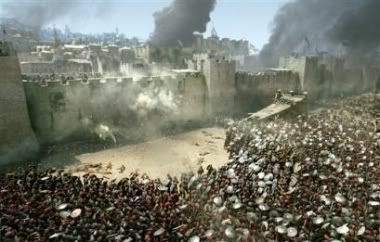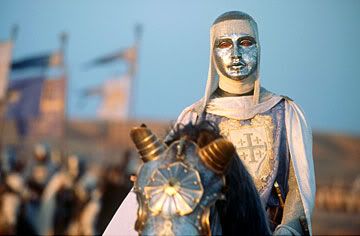"Kingdom Of Heaven" Is a Movie Worth Seeing

Cinematic quality--consistently excellent.
Special effects--Good enough to carry the drama (although the exploding fireballs were a bit much. What did they have in them, plastic explosives?)
Story line--Mostly good to very good.
Entertainment Value--Extremely High. I never lost interest in the movie once.The young "knight," Sir Balian, played by Orlando Bloom, never really seems to mature in either age or wisdom throughout the film, however.
And, how a village blacksmith came to possess such a knowledge of the knightly skills of personal combat and a mastery of the era's most technologically advanced methods of warfare (not to mention the capability to command the defense of a besieged city against an army of over 200,000 men) is never explained. This, among other things, forced me to suspend logic and lessened the "believability" of the movie somewhat.
Also, although as a leader of men he seemed a "sincere" enough , I did not sense the presence of enough gravitas to have motivated me into following him into the "jaws of death."
The other roles, especially that of Sibylla, "Queen of Jerusalem", (played by Iva Green) demonstrated far more complex and believable character development.
Historical Accuracy--Fairly good, so far as I am able to grasp it.
The world of Medieval Jerusalem seemed dusty and dirty enough. The geography of Jerusalem was laughingly naive (but, then again, so was the Jerusalem of Mel Gibson's "The Passion of the Christ").Theology--Accurate enough for a Hollywood epic film. Much better than, for example, "The Ten Commandments," "The Robe" or "The Last Temptation of Christ!"
The complex diversity of personal motives, philosophies and beliefs seemed to reflect reality as I know it.
The siege scenes and other battles seemed to reflect medieval warfare fairly well (although I expect the real thing would have been far more bloody and ghastly than shown in the movie....the battle of the breached wall of Jerusalem, if in fact there was such a thing, would have left a pile of dead soldiers 5-10 deep with rivers of blood making the fight a slippery mess, indeed).
The role of the Knights Templar in seeking to destroy the infidel "Saracens" by whatever means possible (serving under the direct will and authority of the Roman papacy) also seems reasonable enough...although such men would not necessarily have been as corrupt and wicked as those shown in the movie.
The desire of men to have peace with one another (while maintaining control over the other) also seemed to be reflective of a true part of human nature.
I cannot believe, however, that such a belief was widespread or even a significant motivation for those in power and authority in those times. Moral and Religious nuance is not a great motivator for those who must fight and kill one another.
The themes of moral "black and white," "good vs. evil" and "religious absolutes" on both sides were played down almost to the point where they were unrecognizable (except, of course, for the really, really bad guys!
One big omission was the absence of any religious leadership on the Muslim side. Was Saladin the Imam as well as the "King" and "General?" What was the religious motivation and Koranic imperative that drove the Muslims to retake Jerusalem at all costs? Maybe that is asking too much for an action movie. But, seeing that the Christian side was shown to have had spiritual leadership (although generally shown to be either cowardly, corrupt, wimpy or hateful) where were their Muslim counterparts?Along with more than a few excellent films from the past two or three years ("The Passion of the Christ," "Bruce Almighty" etc.), this movie provides a wonderful opportunity for people to consider both the trivialities and profundities of faith and religious conviction as well as their impact on history, both then and now. I hope that Christian pastors will use this opportunity wisely, and not miss it by nit-picking the movie to death over historical and doctrinal minutiae.
It seems that it is still OK to insult Christian spiritual leadership while it is politically incorrect (and possible life-threatening) to cast any aspersions on Islamic spiritual leaders....even if they lived 1000 years
ago!
There is a curious fatalism throughout the movie, on the Christian side as well as the Muslim. God is ultimately in command of history....both of nations and of individuals. All things ultimately exist to serve God's good and perfect will. Yet, as Saladin slyly demonstrates, it took good military sense and planning on Saladin's part before Allah started winning battles for the Muslims! Thus free will is also affirmed. As a Christian I found this paradoxical matter to have been handled well. The fact that it was dealt with at all is a credit to the film.
In many ways the movie seemed to focus on the enigmatic saying of Jesus, "The Kingdom of God is within you." The main characters pointed to the head and to the heart as the location of this Kingdom, in contradistinction from the physical city of Jerusalem which was and still serves as a symbol for that Kingdom whose day is coming.....but not yet!
As a good protestant, I have to agree with the film's thesis that forgiveness and reconciliation with God does not come through a physical pilgrimage to a sacred spot (such as Golgotha, where Sir Balian had hoped to find both God and salvation for himself and for his dead wife). Although such a pilgrimage, as an expression of faith, may help prepare a person's spirit for true repentance, it is, of course, God's saving love in Jesus Christ, received by faith as a free gift of God's mercy, that ultimately reconciles us to God.
The film, however, seems to locate redemption in the purity of one's heart. Yet no matter how pure we may try to be we will always fall short. Sir Balian not only commits murder early in the film but, even while professing to gallantly and heroically uphold the knightly virtues of honesty and purity, commits adultery as well. His willingness, later, to sacrifice his own status and desires for the sake of others, while noble and pleasing to God, cannot atone for his earlier sins. Only Jesus can do that.
Before the siege of Jerusalem, the "Bishop" sarcastically commented that making every man a "knight" does not make them a better fighter. Sir Balian disagrees, saying simply, "Yes, it does."
The medieval Christian ideal of the "purity of the heart" is well displayed in this scene and those which follow. This nobility, later satirized and glorified by Cervantes in "Don Quixote," still remains one of the lasting gifts to us from this otherwise savage and grim age.






<< Home